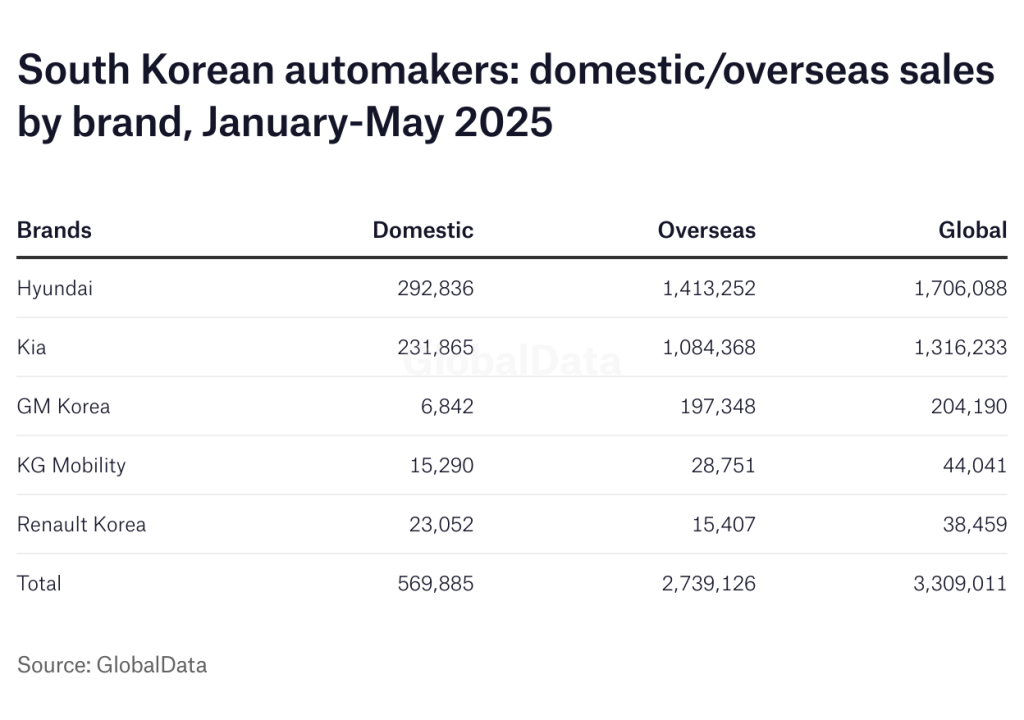South Korea report: domestic sales fall 3% in May

Domestic sales by South Korea’s five main automakers combined fell by 3% to 113,039 units in May 2025 from 116,552 units a year earlier, according to preliminary wholesale data released individually by the manufacturers. The data do not include sales by South Korea’s low-volume commercial vehicle manufacturers including Tata-Daewoo and Edison Motors, while import brands are covered in a separate report later in the month.
The domestic vehicle market last month continued to be supported by the recent roll-out of new products, particularly by the country’s largest automakers Hyundai and Kia. Overall demand in the country remains sluggish, however, due to high household debt and weak sentiment – with consumers spending less on durable goods. Corporate sentiment has also taken a hit due to uncertainty over US trade policies and domestic political upheaval.
Go deeper with GlobalData
The latest economic data showed GDP shrank by 0.2% in the first quarter of 2025, after growing by 2.0% in 2024. The central bank continued to cut its benchmark interest rate in May, to 2.50% from a peak of 3.50% in 2024, to help support domestic consumption.
In the first five months of the year the country’s five main domestic vehicle manufacturers reported a 2.2% increase in domestic sales to 569,885units combined, from 557,741 in the same period last year. Hyundai drove the market higher in this period with sales rising by 2.4% to 292,836 units, while Kia’s sales fell slightly to 230,420 units. Renault Korea reported a 151% surge in domestic sales to 23,052 units year-to-date, reflecting the recent launch of the new Geely-based Grand Koleos hybrid SUV, while KG Mobility saw its sales drop by 23% to 15,290 units and GM Korea’s volumes plunged by 41% to 6,842 units.
Global sales by the country’s “big-five” automakers, including vehicles produced overseas, increased slightly to 3,309,011 units in the first five months of 2025 from 3,297,674 units a year earlier – with overseas sales declining slightly to 2,739,126 units from 2,738,348 previously.

Hyundai Motor’s global sales declined by 1.7% to 351,174 vehicles in May 2025 from 357,099 a year earlier, reflecting both weaker domestic and overseas sales. In the five months of the year the company sold a total of 1,706,088 vehicles, slightly lower compared with the 1,710,278 units sold in the same period last year.

Don’t let policy changes catch you off guard. Stay proactive with real-time data and expert analysis.
By GlobalDataDomestic sales declined by 5.2% to 58,966 units last month from 62,200 a year earlier, with SUVs accounting for 23,232 units while sales by the luxury brand Genesis amounted to 9,517 units. Year-to-date domestic sales increased by 2.4% to 292,836 units from 285,900 previously.
Overseas sales fell by just under 1% to 292,208 units in May from 294,899 units a year earlier, with year-to-date volumes also falling slightly to 1,413,252 from 1,424,378 units, underpinned by strong demand in North America while sales in India weakened.
The company’s new EV plant in the US state of Georgia became operational last October, producing the Ioniq 5 followed by the Ioniq 9 earlier this year. A Kia model is also set to go into production in 2026. The automaker said it will expand capacity at the plant to 500,000 units per year later in the decade from 300,000 at present.
Earlier this year Hyundai set a target of 4,174,000 global vehicle sales for 2025, including its Genesis luxury brand, representing a slight increase over 2024 volumes. This includes 710,000 domestic sales and 3,464,000 overseas sales. In response to the recent US import duty hikes and rising international competition, the automaker stated: “Hyundai will respond flexibly and with agility to the changing global market environment through local production and sales optimization. The company will particularly focus on maintaining its sales volume of hybrid models, while introducing new models to sustain sales growth momentum.”
Kia’s global sales fell by 2.4% to 269,148 vehicles in May from 264,699 a year earlier, supported by strong demand for recently-launched SUV models such as the Sportage and Seltos, with 48,091 and 26,017 deliveries respectively, and the Sorento with 21,889 units. In the first five months of the year global sales rose by 2.3% to 1,316,233 units from 1,286,496 a year earlier.
Domestic sales rose by 7.4% to 45,003 units last month from 46,110 units a year earlier, with the Sorento being its best-selling model with 7,734 domestic deliveries, followed by the Carnival MPV with 6,651 sales and the Sportage with 5,295 units. Year-to-date domestic sales fell slightly to 230,420 units from 231,237 a year earlier. The company sold a further 1,445 special purpose vehicles (SPVs), down from 1,585 a year earlier, most of which were military vehicles delivered domestically.
Overseas sales increased by 2.6% to 223,817 units in May from 218,204 a year earlier and by 2.9% to 1,084,368 units year-to-date from 1,053,674 units, underpinned by a 10% rise in US sales to 352,656 units. The Sportage was the brand’s best-selling model overseas last month with 42,796 deliveries, including 17,063 sales in the US.
Kia is targeting a 4% increase in global sales to 3,216,200 units in 2025, including 550,000 domestic sales, 2,658,000 overseas sales and 8,200 SPV sales, supported by the recent launch of the new K4 and revamped K5 sedans and the Syros SUV in India. In the first quarter of the year the company rolled out its new Tasman pickup truck and the EV4, to be followed by the EV5. Its medium-term plan is to sell 4.3 million vehicles globally by 2030, including 1.6 million BEVs.
GM Korea’sglobal sales fell by 1.8% to 50,029 units in May from 50,924 units a year earlier, reflecting weaker domestic sales, while in the five months of the year volumes dropped by 7.4% to 204,190 units from 220,562 previously. The Trailblazer SUV and Trax crossover vehicle remain by far the company’s best-selling models, with most output shipped overseas.
Domestic sales continued to plunge last month, by 40% to 1,408 units from 2,340 units a year earlier, while year-to-date sales dropped by 41% to 6,842 units from 11,556 units – as the automaker struggled with rising competition from other domestic manufacturers and from importers.
Exports increased slightly to 48,621 units in May from 48,584 a year earlier, but fell by almost 6% to 197,348 year-to-date from 209,006 units. With around 85% of output shipped to the US last year, GM Korea’s CFO Paul Jacobson recently told reporters that the company may consider relocating its operations to the US if the recent US import tariff hikes become permanent.
KG Mobility (KGM) reported a 12% rebound in global sales to 9,100 vehicles in May from 8,130 units a year earlier, reflecting sharply higher overseas sales. Total sales in the first five months of the year were down by almost 7% to 44,041 from 47,207 a year earlier. The company, previously known as Ssangyong Motor, was acquired in late 2022 by a consortium led by local steel and chemicals firm KG Group.
Domestic sales fell by 11% to 3,560 units last month from 4,001 a year earlier, resulting in a 23% drop to 15,290 unitsyear-to-date from 19,876 units, as the automaker struggled to keep up with rising competition from other domestic manufacturers and from importers.
Overseas sales jumped by 34% to 5,540 in May from 4,129 a year earlier, while year-to-date volumes rose by over 5% to 28,751 units from 27,331 units, as the company continued to expand its global market coverage.
KGM plans to further expand its zero-emissions vehicle range, following the launch of a new minivan version of the Torres EVX battery-powered SUV last September. Earlier this year the company launched the new battery-powered Musso EV pickup truck.
KGM recently entered into a strategic partnership with China’s Chery Automobile Company, involving platform licensing and product sharing aimed at helping it strengthen its SUV line-up. The deal will also give KGM access to readily available new energy vehicle (NEV) technologies including vehicle platforms.
Renault Korea‘s global sales rebounded by 48% to 9,860 units in May from a depressed 6,678 units a year earlier, with domestic sales and exports both higher. In the first five months of the year, global sales rose by 16% to 38,459 units from 33,131 previously.
Domestic sales more than doubled to 4,202 units last month from 1,901 units a year earlier, resulting in year-to-date volumes surging by 151% to 23,052 from 9,172 units – reflecting the recent launch of the new Geely-based Grand Koleos hybrid SUV. The company recently restructured its assembly plant in Busan, resulting in more production being allocated for the local market.
Exports rebounded by over 18% to 5,658 units in May from 4,777 a year earlier, while volumes plunged by 35% to 15,407 units in the first five months of the year from 23,959 units, mostly comprising shipments of the Arkana hybrid crossover vehicle (a rebadged XM3).
Renault Korea last year confirmed it will continue to overhaul its product range with a strong focus on SUVs, BEVs and hybrid vehicles, starting with the launch of the new Geely-based Grand Koleos hybrid SUV last July and the phasing out of its aging SM6 mid-size sedan at the end of last year. The company recently agreed to produce the Geely Polestar 4 BEV at its Busan plant from the second half of 2025, for sale domestically and for export.

Sign up for our daily news round-up!
Give your business an edge with our leading industry insights.
Content Original Link:
" target="_blank">






























































